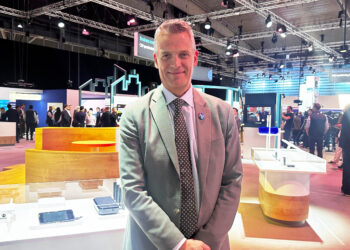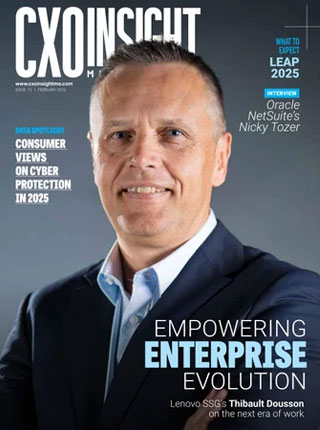Could you elaborate on IFS’ present sustainability endeavours and objectives?
I joined IFS just over two years ago. One of the first tasks on my list in this role, which was newly created in 2021, was to design a sustainability strategy. As I’m sure you’re aware, sustainability is a broad field. Having a focused approach is crucial for success in sustainability. Our strategy at IFS, which we presented to the board in 2022, revolves around three pillars: excellence in our own business, supporting our customers, and broader societal impact within the communities we operate in. Although still broad, this framework guides us. Within these pillars, we identify material issues – topics that are most relevant to us and all stakeholders. For example, under excellence in our own business, diversity is a crucial topic. We recognise its importance in fostering high-performing companies and attracting and retaining talent. Thus, we have a strategy focused on diversity, equity, and inclusion.
Additionally, we prioritise decarbonisation. Our strategy involves reduction as a priority, followed by replacement where reduction isn’t feasible. We also engage with our customers, suppliers, and value chain on decarbonisation efforts. In terms of volunteering, which falls under the third pillar, encompassing some of our longest-standing initiatives, we partner with the IFS Foundation, a separate entity and our charity partner of choice. They do commendable work in Sri Lanka, particularly regarding access to clean water in specific villages. We’ve also seen a 10% increase in volunteering numbers over the last two years, now reaching around 17%. While there’s still much to be done, this progress is commendable. We also focus on supporting our customers, particularly in industries susceptible to sustainability pressures. As a technology company, we believe our impact lies in assisting these customers and facilitating their transition through technology.
How does sustainability align with IFS’s overall business strategy and values?
I like this question because, for me, it’s my starting point. I don’t believe it works to design sustainability separately and then try to match it up with the business strategy or values. One thing I’ve noticed in conversations with customers and peers is that, especially with the burden of compliance, people are being led by the nose. They feel they have to comply with certain regulations without it being part of a coherent strategy about how their business can actually create value. How does it link to business growth? How is it relevant? For me, that relevance point is crucial—it needs to be tied to business values, goals, and how the business sees itself in five or ten years. This is fundamental to the sustainability strategy. Without it, sustainability quickly becomes irrelevant, something people do on top of their day job. So, I draw a clear line between what we’re trying to achieve from a sustainability perspective and what we’re trying to do with our business strategy. For example, look at our move to the cloud and how we’re helping customers transition to IFS cloud, hosted on Microsoft Azure. We can calculate the emission savings at an individual level that we can help customers achieve by moving them to the cloud. There’s a compelling story around the use of our technology from a sustainability perspective. Part of my efforts over the last two years at IFS has been to uncover and articulate that story and find more opportunities to link it to our business strategy.
What measures has IFS taken to reduce its environmental impact?
So, we have a decarbonisation strategy, as I mentioned, focused on reducing, replacing, and engaging. I’m pleased to say we’ve had our science-based targets validated by the Science Based Targets Initiative, which takes us up to 2030. This constitutes a near-term emissions reduction target. Last year, we appointed a climate lead within the organisation. I believe this topic is significant enough to warrant attention, and there’s also considerable interest from our stakeholders in decarbonisation. Therefore, we have a climate lead in the team who oversees our decarbonisation strategy.
We also work on reducing our carbon footprint through the purchase of AAC, and we’re on track to achieve 100% renewable electricity for the second year in a row. This not only helps from a sustainability standpoint but also contributes to bottom-line efficiency.
When we discuss growth and relevance to the business, reducing our carbon footprint isn’t just a positive story from a sustainability perspective. For instance, our approach to working in green buildings forms part of our properties and facilities strategy. When we consider renewing our lease or opening new office sites, we prioritise more efficient and environmentally friendly buildings. This approach benefits us in terms of fuel costs, employee engagement, and the overall atmosphere in the office.
Additionally, we are working on broader environmental initiatives. Despite having a small team, we have one person dedicated to the environmental aspect of ESG. This enables us to have a robust strategy and helps disseminate the message and engage employees. Given that
we are a global company operating in diverse environments, with different environmental priorities in various regions, it’s crucial that we engage with employees at the local level.
How does IFS integrate sustainability considerations into its product development and innovation process?
Around the same time, I joined IFS, we introduced another new position: ESG Product Director. Within our product function, we have an ESG team. Recently, this has been elevated, just like my role in the organisation was elevated to Chief Sustainability Officer. Previously, I was the ESG Director. Similarly, the ESG function within R&D is now part of the R&D leadership. It’s something we are really focusing on. Our approach to sustainability is such that we can’t view it as a bolt-on solution in a silo; it needs to be integrated across our different solutions. As an ERP provider, we see that we can make a significant difference not through numerous bolt-on solutions, but by integrating sustainability considerations into our existing modules. For example, within your human capital management solution, you already have diversity metrics and social metrics that need to be reported. Similarly, within your procurement module, you have supplier data.
Companies like IFS, the major ERP companies, have an advantage over those targeting smaller bolt-on solutions. As pressure grows for companies to report and act on sustainability, it’s not sustainable financially to rely on numerous separate solutions to address different aspects. Therefore, we are aiming for sustainability to be embedded across IFS Cloud and our various solution areas, making sure it’s accessible and usable for our customers. We want customers to not only report this data but also use it effectively. This is a key focus for us from a product standpoint. It’s not just about compliance; it’s about ensuring the information is relevant, useful, and not confined to sustainability teams but accessible to decision-makers such as the head of procurement or head of finance, enabling them to use it for day-to-day operations, predictions, and planning for the future.










Discussion about this post